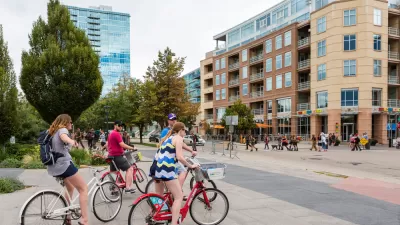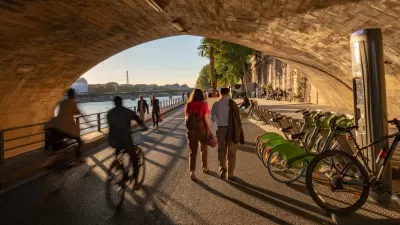The French city’s air quality has improved dramatically in the past 20 years, coinciding with a growth in cycling.

The push to promote biking in Paris, France is paying off, with the city seeing a dramatic improvement in air quality over the last two decades. As Ron Johnson explains in an article for Momentum, “between 2005 and 2024, levels of nitrogen dioxide and fine particulate matter — two of the most harmful pollutants to human health — have been slashed by 50% and 55%, respectively.”
City leaders including Mayor Anne Hidalgo have been making a concerted effort to pedestrianize parts of the city, improve bike infrastructure, and promote active transportation in the French capital. “Key initiatives like the pedestrianization of the banks of the Seine and the creation of a Zone à Faibles Émissions (Low Emissions Zone) helped set the tone. Alongside these measures came an explosion of bike infrastructure: over 1,000 km of bike lanes now crisscross the city, many of them separated and protected, with entire stretches designated for cyclists and pedestrians only.” Thanks to the changes, bike trips tripled between 2010 and 2022.
For Johnson, “Paris’s journey is a masterclass in how a city can reclaim its air, its streets, and its identity through the power of policy — and the pedal. It’s also a timely reminder for other major cities facing their own pollution challenges: if you want cleaner air, start by making space for bikes.”
FULL STORY: Paris Proves the Power of Pedals: How Cycling Helped Cut Pollution in Half

Maui's Vacation Rental Debate Turns Ugly
Verbal attacks, misinformation campaigns and fistfights plague a high-stakes debate to convert thousands of vacation rentals into long-term housing.

Planetizen Federal Action Tracker
A weekly monitor of how Trump’s orders and actions are impacting planners and planning in America.

Chicago’s Ghost Rails
Just beneath the surface of the modern city lie the remnants of its expansive early 20th-century streetcar system.

Bend, Oregon Zoning Reforms Prioritize Small-Scale Housing
The city altered its zoning code to allow multi-family housing and eliminated parking mandates citywide.

Amtrak Cutting Jobs, Funding to High-Speed Rail
The agency plans to cut 10 percent of its workforce and has confirmed it will not fund new high-speed rail projects.

LA Denies Basic Services to Unhoused Residents
The city has repeatedly failed to respond to requests for trash pickup at encampment sites, and eliminated a program that provided mobile showers and toilets.
Urban Design for Planners 1: Software Tools
This six-course series explores essential urban design concepts using open source software and equips planners with the tools they need to participate fully in the urban design process.
Planning for Universal Design
Learn the tools for implementing Universal Design in planning regulations.
planning NEXT
Appalachian Highlands Housing Partners
Mpact (founded as Rail~Volution)
City of Camden Redevelopment Agency
City of Astoria
City of Portland
City of Laramie





























